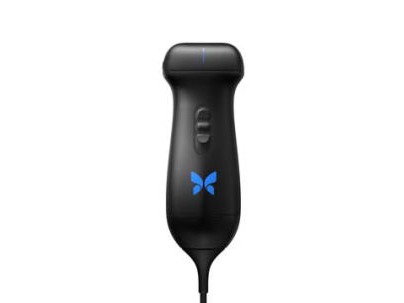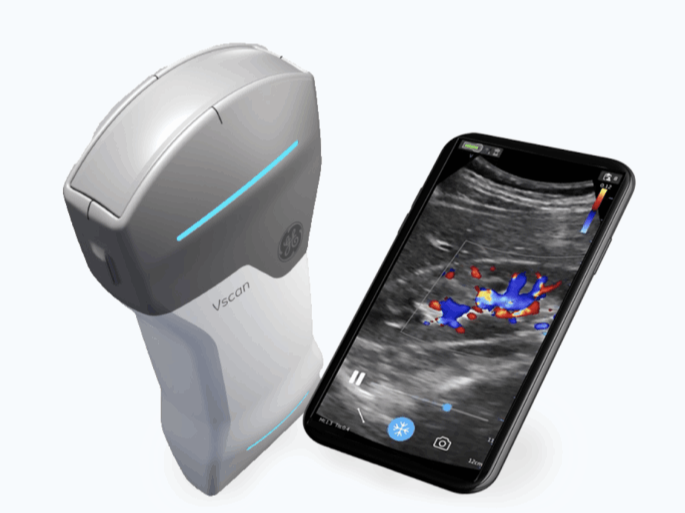Whatever device you choose, the RUF requires you have access to your own device in every clinical location, and at all times. We do NOT want you to rely on occasional access to a hospital machine (often with limited probe selection or other missing features.)
Note: all probes below are listed as having 3 year warranties, which realistically will be the life expectancy of a handheld probe during this era of rapid ultrasound advancement.
Note: all probes below are listed as having 3 year warranties, which realistically will be the life expectancy of a handheld probe during this era of rapid ultrasound advancement.
last updated: 15 September 2025

Butterfly iQ3 🇺🇸
(released Feb 2024)
3 probes in 1. (3rd generation)
~$5,299 CAD + $290-600/year* (conditional)
☙ All-in-one probe: Butterfly's microchip technology permits one probe to do the scanning of all three most common probes. (i.e. linear, curvilinear, phased)
☙ Proprietary features / modes available only on Butterfly. In addition to iQ+ features of Bi-Plane® and Needle-Vis®: this model also has iQ Slice® technology.
☙ Same advantages as iQ+ in terms of Robustness / drop testing, Full suite of advanced features, Secure Butterfly Cloud storage and sharing and Realtime virtual scanning.
☙ Cord-Dependent. (Can be an asset or liability!) Bluetooth connections can be fickle and often delay startup), but cords can get caught and wound up or break.
Our thoughts: Butterfly iQ3 offers more detailed resolution than the older Butterfly models (iQ & iQ+). It is comparable to some lower end cart based machines in many applications. Cardiac resolution is still the weakest point, but much improved in this latest model.
Like its predecessor, iQ3 offers even more proprietary features than even cart-based machines. While these bells and whistles are interesting, and in occasional circumstances helpful, they are not of major importance when learning / practicing comprehensive bedside ultrasound.
95% of comprehensive ultrasound scanning is in B-mode. Butterfly iQ3, and Clarius PAL-HD3 have similar resolution, depending on the application. Clarius offers slightly superior resolution in cardiac at the cost of less resolution in abdominal, MSk compared to the VScan Air.
Butterfly iQ3 has a list of "compatible devices" (check their website for which phones / tablets will work before you buy.)
Overall, iQ3 offers the best value, with top shelf resolution in the hand-held ultrasound class. Spending more on the Clarius PAL-HD3 or GE VScan Air, will increase your resolution gains slightly in certain circumstances.
Another potential advantage of the iQ3 is that it is corded meaning you have near instant availability to scan (2s) compared to bluetooth delays reported in real world testing with the other devices.
* The Rural Ultrasound Fellowship presently carries an medical education subscription which saves our fellows the annual subscription fee required to access all advanced features.

Clarius PAL HD3 🇨🇦
(released Nov 2024)
Clarius' first "all in one" probe (Nov 2024)
~$8,200 CAD + $595/year*
☙ All-in-one probe: Clarius combines a phased array/curvilinear array combo with linear array in a side-by-side arrangement to offer full body functionality.
☙ Full suite of advanced features (seldom available on hospital-based machines) including Pulsed-Wave Doppler & Needle Enhancement.
☙ Secure Clarius Cloud Storage making it easy to store, share & review scans with your professors and co-fellows. Auto-cataloguing your scans is especially helpful during the fellowship training.
☙ Realtime remote ultrasound support is possible. i.e. connect virtually, in real time with a fellowship faculty member. We will see your images and can provide live feedback as you scan.
☙ Cordless. (Can be an asset or liability!) Bluetooth connections can be fickle and often delay startup, but cords can get caught and wound up or break.
Our thoughts: Clarius currently offers high detail in B-mode resolution, (as good as some cart based machines in certain applications). 95% of comprehensive ultrasound scanning is in B-mode. Butterfly iQ3, and Clarius PAL-HD3 have similar resolution, depending on the application. Clarius offers slightly superior resolution in cardiac at the cost of less resolution in abdominal, MSk compared to the VScan Air.
Clarius offers a full feature set including pulsed-wave doppler, thus it is a good choice for full fellowship learning, especially if you do not have access to a quality / full feature set cart-based machine to practice with.
The bluetooth connectivity can be irritating for wireless devices. RUF testing of the Clarius PAL-HD3 yielded delays of up to 30s for connection at times, which is quite frustrating when using the devices frequently in a busy clinic or ER.
The probe does get uncomfortably hot for some users after 20 minutes (even with the cooling fan accessory.)
Clarius also offers an education discount for RUF fellows & alumni.
Overall, If price is not a hinderance, this is a solid choice that arguably offers the best hand-held cardiac resolution at this time.
*option for one time / lifetime subscription. Probe also works with reduced functionality without a subscription renewal.

GE VScan Air CL 🇺🇸
(released Aug 2023)
3 probes in 1. (several generations)
~$6,600 CAD (no mandatory subscription)
☙ All-in-one probe: GE has created a probe where one end is Linear, the other is Curvilinear / Phased Array combined.
☙ Robust. Drop tested to Military Standards & Waterproof. That equates to peace-of-mind when cleaning your device or moving your equipment between ER & clinic or using it during a busy shift.
☙ Best in class for B-mode imaging, which represents 95%+ of imaging mode used in most Comprehensive Rural Applications. Colour-mode, M-mode & Pulsed Wave Doppler are all available in addition making this a great probe for fellowship-level training.
☙ Cordless. (Can be an asset or liability!) Bluetooth connections can be fickle and often delay startup), but cords can get caught and wound up or break.
☙ Less bells/whistles & AI-based features that other manufacturers are focusing on. These features are rarely helpful at the fellowship level though, and thus may not be a significant disadvantage.
Our thoughts: VScan Air offers the most detailed B-mode resolution, (comparable to some cart based machines in most applications).
95% of comprehensive ultrasound scanning is in B-mode. Butterfly iQ3, and Clarius PAL-HD3 have similar resolution, depending on the application. Clarius offers slightly superior resolution in cardiac at the cost of less resolution in abdominal, MSk compared to the VScan Air.
VScan Air does not currently have a built-in archiving system that we are aware of, however when used on an Apple device it can air-drop clips and images it saves quite easily to an iPhone / iPad / OSX computer. We have not yet tested this feature on Android / PC devices. For RUF purposes, it is not difficult to archive recorded scans to our catch-all archiving service.
The bluetooth connectivity can be irritating for wireless devices. RUF testing of the VScan air yielded delays of up to 15-20s for connection at times, which could be quite bothersome when using the devices frequently in a busy clinic or ER.
Overall, GE VScan Air is a solid choice at a competitive price point. It offers superior hand-held resolution in most applications (except cardiac.) B-mode resolution is the most important factor at fellowship level scanning.
*optional subscription for cloud service (archiving scans automatically) may be available.